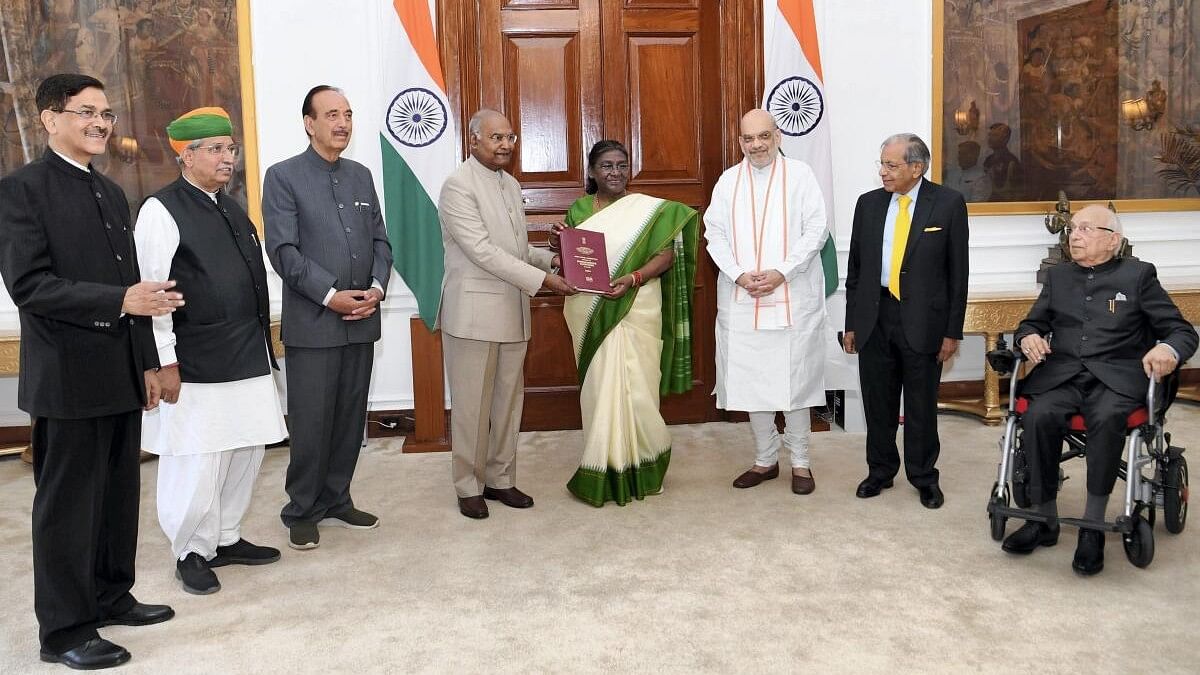
Ram Nath Kovind, Chairman of the High-Level Committee (HLC) on 'One Nation, One Election', presents the report to President Droupadi Murmu, in New Delhi, Thursday, March 14, 2024. Union Ministers Amit Shah and Arjun ram Meghwal, DPAP leader Ghulam Nabi Azad are also seen.
Credit: X/@rashtrapatibhvn
New Delhi: A high-level committee headed by former President Ram Nath Kovind on Thursday recommended holding simultaneous polls for all three tiers of governance, saying it will optimise scarce resources, encourage voters to participate in electoral process and end disruption to governance.
The panel on 'One nation-One election' recommended a two-step approach to lead to the simultaneous elections. As the first step, simultaneous elections will be held for the Lok Sabha and the State Legislative Assemblies.
In the second step, elections to the Municipalities and the Panchayats will be held within 100 days of holding elections to the Lok Sabha and State Assemblies. The committee also recommended that there should be a single electoral roll and Electoral Photo Identity Cards for use in elections to all the three tiers of government.
The panel recommended for amendments to the Constitution to enable holding simultaneous elections in the country, saying asynchronous elections caused uncertainty and instability, thwarted supply chains, business investments and economic growth, besides causing hardship to citizens.
The committee felt simultaneous polls will bring fundamental transformation in the electoral process and overall governance.
For the first step of simultaneous elections for the House of the People (Lok Sabha) and the State Legislative Assemblies, no ratification by the States will be required for the Constitutional Amendment, it noted.
In the event of a hung House, no-confidence motion, or any such event, fresh elections should be held to constitute the new Lok Sabha or Vidhan Sabha for the unexpired term of the House of the People, the panel said.
To synchronise elections to the Municipalities and the Panchayats with the House of the People and the State Legislative Assemblies will require ratification by not less than one-half of the States, it said.
"Since local body elections touch upon the State subjects (Entry 5) of schedule VII, Part IX, and Part IX A of the Constitution, ratification by the States will be required under Article 368 (2) of the Constitution," it noted.
Similarly, for the purpose of preparation of single electoral roll and electoral photo identity cards (EPIC) for use in elections to all the three tiers of government, amendments in the Constitution were recommended to enable Election Commission to prepare a single electoral roll and EPIC in consultation with the State Election Commissions. These amendments will require ratification by not less than one-half of the States, it said.
In the event of a hung House, no-confidence motion, or any such event, fresh elections should be held to constitute the new House of the People or State Legislative Assembly for the unexpired term of the House of the People, it said.
The committee recommended that for meeting logistical requirements, the Election Commission will plan and estimate in advance in consultation with the State
Election Commissions, and take steps for the deployment of manpower, polling personnel, security forces, EVMs/VVPATs, etc, so that free and fair simultaneous elections are held in all the three tiers of the government.
Prime Minister Narendra Modi has a number of times advocated for the need for exploring the possibility of holding simultaneous polls to avoid wastage of time and resources.
Constituted on September 2, 2023, the panel also comprising Amit Shah, Union Minister of Home Affairs and Minister of Cooperation, Ghulam Nabi Azad, former Leader of Opposition in Rajya Sabha, N K Singh, former Chairman, 15th Finance Commission, presented its 18,626 page report to President Droupadi Murmu.
Subhash C Kashyap, former Secretary General, Lok Sabha, Harish Salve, senior advocate, and Sanjay Kothari, former Chief Vigilance Commissioner were also the members of the panel
Arjun Ram Meghwal, Minister of State (Independent Charge) Ministry of Law and Justice was a Special Invitee and Niten Chandra was its Secretary.
The committee noted simultaneous elections have been drawing the attention of political parties and their leaders, policymakers, academicians, industry leaders, businesses, citizens and others.
It noted frequent elections burden the government exchequer with additional expenditure. If the expenditure incurred by political parties is also added, these figures will be even higher.
"Asynchronous elections cause uncertainty and instability, thwarting supply chains, business investments and economic growth. Disruption of government machinery due to asynchronous elections causes hardship to citizens. Frequent use of government officials and security forces adversely affect discharge of their duties and repeated imposition of the Model Code of Conduct (MCC) causes policy paralysis and slows down the pace of the developmental programmes," it said.
Besides, staggered elections induced ‘voters’ fatigue’ and presented a significant challenge in ensuring their participation, it added.
